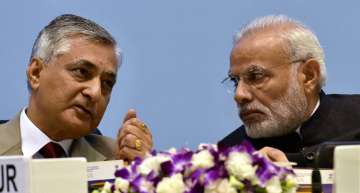Chief Justice T.S.Thakur and Prime Minister Narnedra Modi sought to encourage arbitration instead of regular court proceedings to resolve commercial disputes, an appeal prompted by the concerns over ease of doing business in India.
Lamenting that an avalanche of cases is putting the judicial system under stress, Chief Justice of India T S Thakur Sunday pitched for revisiting legal framework to encourage arbitration and reforms in the existing government-run institution as it has performed "dismally".
He also lamented that India lacks proper institutions to hold arbitration proceedings, forcing people to approach "five star hotels and clubs" for the purpose.
Referring to government-run International Centre for Alternative Dispute Resolution, he said in its two decades of existence, it has handled only 20 cases which talks of its "dismal performance".
"Domestic adjudication (of arbitration cases) has a great promise for litigants and overburdened courts...courts are overburdened, judges are overworked...18000 judges handled 50 million cases and disposed of 20 million cases...an avalanche of cases is putting the judicial system under stress," Justice Thakur said here.
Referring to the epic Mahabharata, he said Lord Krishna tried to mediate between Kaurava and Pandava, but failed.
"Even gods can fail in mediation, but that does not mean, it is not successful...those who did not see reason were annihilated," he said in lighter vein.
Addressing an international conference on arbitration in the presence of Prime Minister Narendra Modi, he said there is a need to "revisit" the legal framework regarding arbitration awards.
The framework should "address and reduce prolongation in courts" once the arbitration award has been granted.
How judiciary will deal with arbitral award and the time courts take in deciding cases are arbitral award need to be looked into, the CJI said.
He said litigants and arbitrators prefer to go "to five star hotels and clubs to hold proceedings. Niti Bagh club here is a preferred choice as it provides facilities to hold such proceedings".
He said Singapore is a preferred arbitration hub not because it has an impressive building or provides translation facility, but because of its legal framework.
Justice Thakur said the criticism that courts interfere in arbitral awards is "not misplaced."
"I personally hold the view that once an award is made and it is challenged in the court, the first question the judge asks is 'who is the arbitrator'. This is because the judge wants to know whether the award is honest. There have been cases where the judges have faltered.
"But there is a general impression, and I think it is a well-founded impression, that when it comes to a judge working as an arbitrator, the court will presume that the arbitration award may suffer from any error as such but will not have any element of having being corrupted by any exterious consideration," he said.
He said there is a need to sensitise judges to show deference to arbitration awards, subject to the grounds on which such awards can be challenged.
PTI inputs
Latest India News
